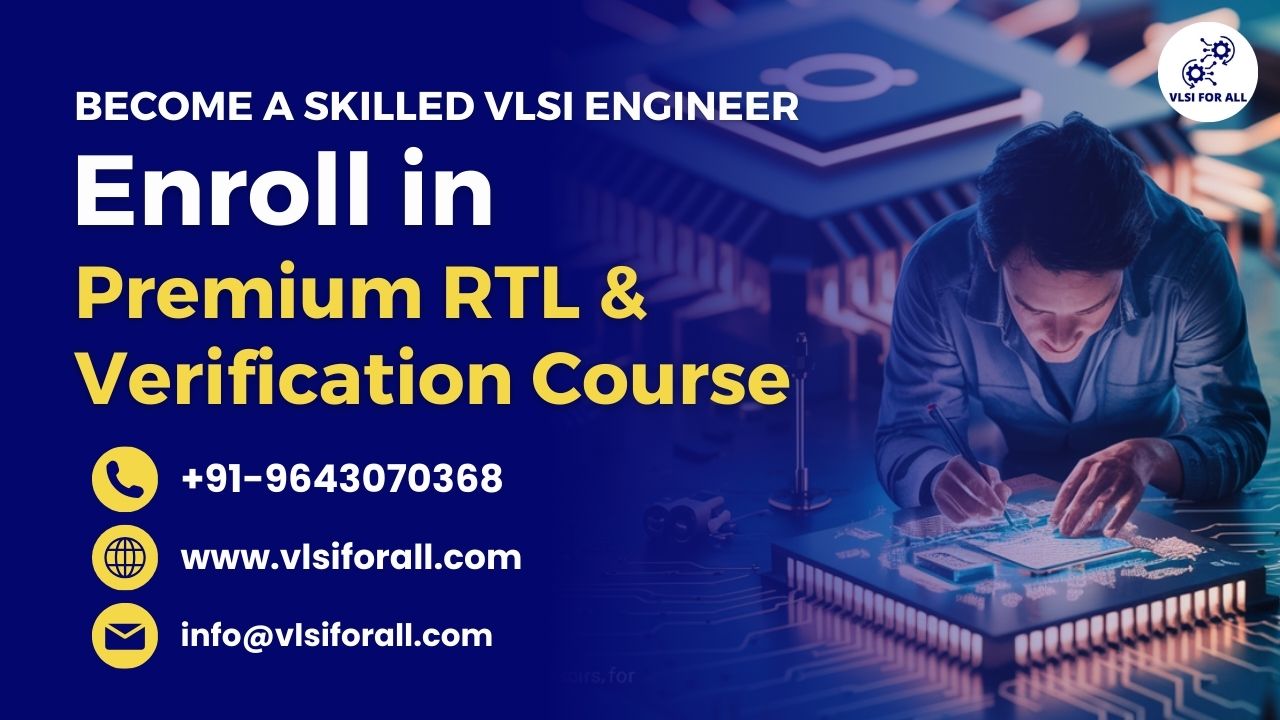Module 1: Digital Electronics & Basic Electronics Foundation
-
Number Systems & Codes
-
Boolean Algebra & Logic Gates
-
Combinational Circuits (MUX, DEMUX, Encoder, Decoder)
-
Sequential Circuits (Flip-Flops, Counters, Registers)
-
Timing Diagrams & Hazards
-
Basics of:
-
Analog Electronics
-
Electronic Devices and Circuits (EDC)
-
Computer Architecture
-
Microprocessors and Microcontrollers
-
Object-Oriented Programming (OOPS) and C/C++
-
Module 2: Verilog HDL – Theory & Practical Coding
-
RTL Design Fundamentals
-
Verilog Language Constructs
-
Data Types, Operators, and Control Statements
-
Procedural Blocks (initial, always)
-
-
Behavioral vs Structural Modeling
-
Tasks and Functions
-
Testbenches
-
FSM Design and Implementation
-
Synthesis Guidelines
Module 3: VHDL
-
Introduction to VHDL Syntax and Modeling Styles
-
Data Flow, Behavioral, and Structural Modeling
-
Testbench Development in VHDL
-
2 Mini Projects using VHDL
Module 4: RTL Design – Advanced Topics
-
Metastability and Design Implications
-
Synchronization Techniques
-
CDC (Clock Domain Crossing) Techniques
-
LINTING Tools & Guidelines
-
Power Optimization Techniques
-
Clock Gating & Area Optimization
-
Writing Synthesizable Code
-
Debugging and Optimization Techniques
Module 5: Static Timing Analysis (STA)
-
Timing Basics: Setup, Hold, Skew, Slack
-
Timing Paths and Analysis Flow
-
Constraints (SDC)
-
Timing Closure Techniques
-
Practical STA Examples
Module 6: Aptitude + Algorithmic Interview Prep
-
Quantitative, Logical & Verbal Reasoning
-
30 Algorithmic Interview Puzzles
-
Problem-solving for hardware design and logic
Module 7: Projects – Practical Application
-
5 Mini Projects (e.g., ALU, Traffic Light Controller, FIFO, UART, etc.)
-
5 Major Projects (e.g., CPU Design, Memory Controller, RISC Processor)
-
5 Protocol-Based Projects (e.g., SPI, I2C, AXI, UART, AMBA)
-
3 Projects using SystemVerilog + UVM (End-to-End Verification Environments)
Module 8: SystemVerilog for Verification
-
Data Types, Interfaces, Modports
-
OOP Concepts in SV
-
Constrained Randomization
-
Functional Coverage
-
Assertions (Immediate & Concurrent)
Module 9: Universal Verification Methodology (UVM)
-
UVM Architecture
-
Sequence, Driver, Monitor, Scoreboard, Agent, Environment
-
Factory & Configuration Mechanisms
-
UVM Reporting & Messaging
-
UVM Testbench Development
-
3 Industry-grade Projects with SV + UVM
Module 10: Scripting & Tools
-
Perl, Python Basics for Automation
-
Makefiles and Version Control (Git)
-
Linux Fundamentals for VLSI Engineers
-
Tool Exposure: Simulation, Synthesis, STA, LINT Tools (Synopsys, Cadence, Mentor)
Module 11: Interview Preparation & Career Support
-
5000+ Interview Questions with Solutions (RTL + Verification + Electronics)
-
Resume and CV Building Workshops
-
Mock Interviews with Industry Experts
-
FREE Premium Referral Program
-
24x7 Support System for International Students
-
Placement Assistance in India, USA & Europe until placed in dream product-based VLSI companies
Module 12: Mentorship & Industry Guidance
-
Weekly One-on-One Mentoring
-
Live Q&A Sessions
-
Career Planning with Top Industry Mentors
-
Guidance for MS/PhD and International Job Roles



.png)


